This talk was delivered by Christopher Dawson Centre‘s Director, Dr David Daintree, at the first official Sydney dinner held on 27th October 2022 at The Royal Automobile Club of Australia.
Lovely of you all to turn up tonight at what is the Dawson Centre’s first official venture beyond Tasmania and ‘the Athens of the South’. I thank you all from my heart, but my warmest thanks must go to Sophie York and Naomi Spinks. Sophie for her precious friendship and passionate energy on behalf of Christian civilisation; Naomi, as assistant director of the Centre, for her loyal dedication as our anchor in Sydney. I should apologize, by the way, for appropriating the term ‘Athens of the South’ for little old Hobart. I’ve since been reminded that Adelaide has long claimed it for its own. I guess I’m guilty of cultural appropriation – never a good look when an old white geezer does it.
Once in a while Providence throws up a splendid synchronicity of famous births. The second-last decade of the fifth century (480-490 AD) was one of those special times. What other period and place in history has produced three people whose influence on the centuries to come has been as potent and far-reaching as St Benedict, Boethius and Cassiodorus?
The best known of the three is St Benedict, writer of the famous Rule, and effective founder of Western Monasticism. Benedict – like many, though by no means all, of the Church fathers was tolerant of secular learning provided that it was morally consistent with the values of Christianity. Copying books in the scriptoria – the ‘book factories’ – of Benedictine monasteries became an important charism of monastic life. As a result all we possess of the learning of the ancient world of western Europe comes to us through the hands of his monks and their successors and nuns too in the same tradition. All we possess – even the poems of the amorous Catullus and that sad old agnostic Lucretius – it’s a huge claim, but a true one.
Next is Boethius who died in prison in 524, having offended the tyrant King Theodoric. Offending people has become a crime again nowadays; we can console ourselves with the thought that there’s nothing new under the sun. Boethius left behind his personal manifesto Of the Consolation of Philosophy, one of the most widely-read and influential books in the Christian world. King Alfred of England thought the Consolation so important that he translated it into English, deeming it to be one of the books that every person lucky enough to learn to read or write should read in those dark days of conflict with the Vikings.
In a favourite passage of mine, Boethius defined eternity as ‘the complete, simultaneous and perfect possession of boundless life’ – ‘interminabilis vitae tota simul et perfecta possessio.’ Eternity doesn’t just mean endlessness, he insists. It has nothing to do with mere length of days. If we were to live ten thousand years or more, that continuous sequence of days would be at best a metaphor of eternity, a poor linear imitation of a state that cannot yet be grasped by our little minds. Even if the world had had no beginning and will never end, that would just be a linear sequence of days. Eternity is of a completely different order: to God who is eternal all things are present – he has no past and no future – his nature is ‘simplex’, not complex. It’s like a Chestertonian paradox: we are complex, but God is simplex! Our lives are compartmentalized into our past (which we have lost), our fleeting present, and our unknown future, but God and his saints live ‘simply’ in the ever-present and total apprehension of all things. Dr Who and his Time Lords can show us nothing as exciting as this! God sees the pain, but he also sees the glory. It is from the stance of eternity that Christ was able to say, ‘before Abraham was, I am’.
Cassiodorus is the least known of the three. He was an educational innovator who founded a scholarly community called Vivarium (it means a nursery or a place where young things are nurtured): the evolving notion of the so-called ‘liberal arts’ – those humane studies best suited to be the educational staple of free men – probably owes more to him than to any other individual. Making books was a primary task of his community. He saw no necessary conflict between the Gospel and the noblest achievers of the secular and pagan world, believing that the latter, too, had had at least a glimpse of God.
There has always been a tension in the Church between those who reject all the achievements of paganism (I use paganism in the sense of everything that is not explicitly Christian), and those who see even in paganism glimmerings of truth and traces of the Spirit. St Augustine commended Moses and the children of Israel for ‘spoiling the Egyptians’, taking and adapting the best of paganism for their own use. Why should the devil have all the best tunes? Cassiodorus comes down firmly on the side of those who see value in the traditions of high-minded people who through no fault of their own never knew Christ. Centuries later Newman shows himself to be on the side of this Christian humanism when he argues for the teaching of literature in schools:
If then a University is a direct preparation for this world, let it be what it professes. It is not a Convent, it is not a Seminary; it is a place to fit men of the world for the world. We cannot possibly keep them from plunging into the world … when their time comes; but we can prepare them against what is inevitable; and it is not the way to learn to swim in troubled waters, never to have gone into them…
What a century that was! To complete the picture a fourth contemporary of these three was the great Emperor Justinian (born about the same time as the other three, in 482), whose generals spent twenty years campaigning up and down the length of Italy in the hope of expelling the barbarians and restoring Rome and the whole peninsula to the Empire. It was a venture enormously expensive in gold and lives and its success was tragically short-lived. Poor Boethius never lived to see those two decades of terrible conflict, but Benedict did, and his Rule was written amidst that world of violent chaos. Cassiodorus must have seen it all beyond the walls of his nursery.
I’m going to digress somewhat, for reasons that I hope will become apparent.
The poet Coleridge said that there are just two types of people:
Every man is born an Aristotelian, or a Platonist. I do not think it possible that anyone born an Aristotelian can become a Platonist; and I am sure no born Platonist can change into an Aristotelian. They are the two classes of men, besides which it is next to impossible to conceive a third.
Sullivan’s partner W.S. Gilbert happily simplifies that:
‘… nature always does contrive,
That every boy and every gal
That’s born into the world alive
Is either a little liberal
Or else a little conservative. Fa, lal la!’
Another writer, F.D. Maurice, maintained that all little children are Platonists, but their education makes them Aristotelians. That idea had emerged in Wordsworth’s Great Ode on the Intimations of Immortality:
‘… trailing clouds of glory do we come
from God, who is our home:
Heaven lies about us in our infancy!
Shades of the prison-house begin to close
Upon the growing Boy …
At length the Man perceives it die away,
And fade into the light of common day.’
Forget the usual forms of psychometric analysis such as the once trendy enneagram, with its nine different personality types. What Coleridge, Wordsworth, Maurice and even Gilbert were saying is that there are really just two categories of people. We’d now call them liberals and conservatives. The terms ‘Aristotelian’ and ‘Platonist’ do the same job, if a bit more technical. The distinction between ‘Left-wing’ or ‘right-wing’ doesn’t work at all because it’s far too limiting; those are political terms only.
Is all this just bunkum? I’m going to plead for it, because in my view it goes a way towards explaining so many of the polarities in life. Let’s try to clarify what we mean by liberal and conservative.
Concocting a working definition of the latter is easier if you happen to be a conservative! In my view conservative is not at all a political term. Sure, there are right-wing conservatives, but many are not at all. Pope St John Paul II was a social conservative, needless to say, yet an outspoken critic of capitalism. To call him right wing would be abusive, not accurate. Many on the political left invest in the stock market and sit on company boards, practices traditionally associated with the right. I’m struck by the number of people I know who are of the left politically yet are deeply conservative on social issues. In NSW Mark Latham, Gary Johns and Greg Donnelly are examples.
No, conservatism properly understood has no necessary connection with politics. It is an attitude of mind that respects humanity but recognizes its limitations; like Pollyanna it prefers to think its bottle is half full rather than half empty, cautiously believes in progress but is wary of change for change’s sake. To conservatives truth is real and absolute. The old world continues being a sphere no matter how many of us think it flat. Conservatives hate that stuff about ‘your truth’ and ‘my truth’.
Conservatives usually believe that Mankind is superior to all other creatures, even created in the very image of God.
Conservatives believe that we have a duty to make progress, to husband the earth, to make it a better place. To that extent at least we are also greenies.
Conservatives believe that men and women are different but complementary, yet equally precious in the eyes of God.
Conservatives deny that the mere circumstance of being born can ever be the sole test of being human. Most of us insist that infanticide is a moral crime, whether committed before or after birth.
Conservatives tend to believe that education should be for life. Learning trades and skills is important, but the Whole Person should be cared for and prepared for its eternal destiny. Schools and parents must share responsibility for morality and music, literature and art, and all the special things that distinguish mankind from the beasts.
To many conservatives – call them Platonists if you will – the unseen world is even more real than this world of taste and sound and sight that we experience about us in the light of common day. There are profounder realities that can only be perceived by us, if at all, through a glass, darkly.
So much for the conservatives, or Platonists, or whatever we prefer to call them.
What shall we say about the other half of humanity, the liberals, the practical people, the ‘realists’ as they often like to call themselves? A rabbi friend once told me that he thought of atheists as ‘spiritually tone-deaf’. That thought made a huge impact on me. Liberals tend to be sceptics, and prone to deny the existence of anything they can’t see or measure. Liberals dominate in our overwhelmingly Aristotelian world, with its emphasis on the primacy or even exclusivity of sense perception as the basis of all knowledge. They don’t hear the music of the spheres. They think conservatives are mere dreamers.
Listen to Matthew Arnold’s famous encomium passage on Oxford University:
Spreading her gardens to the moonlight, and whispering from her towers the last enchantments of the Middle Age, who will deny that Oxford, by her ineffable charm, keeps ever calling us nearer to the true goal of all of us, to the ideal, to perfection, – to beauty, in a word, which is only truth seen from another side? Adorable dreamer, whose heart has been so romantic! who hast given thyself so prodigally, given thyself to sides and to heroes not mine, only never to the Philistines! home of lost causes, and forsaken beliefs, and unpopular names, and impossible loyalties!
Who could now talk like that about any modern university (including Oxford itself) – without being thought barking mad? Our modern secular institutions have by and large lost their way. The theological and ethical dimensions of education have been discarded; universities are frightened of taking any position on moral issues, and simply see them as none of their business.
Do you think this division into two classes of men has legs? I do, but it mustn’t be too rigidly applied. It doesn’t work, for example to say that all Catholics are Platonists because they so highly value sacraments and images, or that all Protestants are Aristotelians because of their suspicion of symbols and their devotion to the literal word of God.
There have been many Protestant mystics. On the one hand the great iconoclastic controversy of the 8th and 9th centuries nearly tore the Catholic church apart, riven by disagreement on the value of images, bitterly divided between those who treasured images as effective symbols of the divine, windows into Heaven, and those who with almost Islamic fervour smashed graven images because they thought them an insult to God. Against that there were protestants, Anglicans, who hid treasured windows and statues which they had faithfully preserved from the ruins of Catholic England, to save them from other protestants, the soldiers of Oliver Cromwell.
Human beings are pretty much the same creatures as they always were. From time to time and place to place they might differ culturally and in their levels of education, but they share roughly the same capacity for reasoning and memorising and making things. If that’s true, where to we look nowadays to find the liberals and the conservatives?
Not in the usual places. When I was a child it was carefully explained to me that the Liberal party was actually a conservative party, that big-L liberal was quite a different creature from the small-L variety. We can kiss goodbye to that now. The conservative remnant in the Liberal party looks more like an endangered species.
So where are the conservatives and Platonists today, if they’re not where we used to find them? I’m going to suggest that they’re mainly on the left. But with one vitally important rider best expressed by this remark ascribed to Chesterton:
When men choose not to believe in God, they do not thereafter believe in nothing, they then become capable of believing in anything.
As Chesterton saw, and Christopher Dawson likewise insisted, when God is forgotten and abandoned, civilisation is doomed and the world goes mad. Everything is skewed. Dreams become nightmares.
The modern left is stacked with people who manage to believe any number of unseen and impossible things, who have left sense perception far behind. These are religious people without God and, like the worst kind of religious people in every age, they can be vicious and intolerant heresy hunters.
To such people climate change is an ‘existential threat’. You’d better believe it. Our response is that abortion and contraception are far more dangerous, but they’ll never buy that. By contraception I’m not looking at particular methods, but at the general and deliberate avoidance of children, restricting families to one or two children, or none at all, so that population growth falls below the replacement rate. Now that is an existential threat, as the people of China and Japan and the ‘aboriginal’ people of some European countries are at last coming to recognise – probably too late.
If you want more instances they’re not hard to find:
So-called gender fluidity is based on nothing in the visible world, human or animal. If there were any truth in it our agricultural industries would be in big trouble. How can people who deny the existence of the soul talk about being born in the wrong body? To believe such things you have to be some kind of mystic, though a deranged one.
Lastly, and with some anxiety, I’ll touch on the emerging mythology around the so-called First Nations people. I tell you with pride that I was one of the 91% who voted YES in the 1967 referendum. I recall nothing but sympathy for, and goodwill towards, aboriginal people in my school days. Younger people who weren’t there tell me I’m dreaming – making it up or lying – because they’ve seen only a far worse situation unfolding in recent decades. It has got worse, and aboriginal elders are worried about the rising number of false claimants. Cultural appropriation can pay well. This has got to be stopped in the interests of truth. But hey, what does truth matter if you’re a dreamer?
If my quirky theory holds any water, then many on the hard left can be best understood if we recognize them as sort of rogue Platonists, temperamentally religious people for whom an unseen world is more important than the world of facts and statistics. If we want to combat them effectively reasoning won’t work. We need to be wary but also kind: we are treading on their dreams. Such people are of course useful idiots, manipulated by hard-line activists who haven’t got a platonic bone in their bodies, but the godless mystics deserve our kindness not our anger. And our prayers, if that’s our inclination.
I began by talking about the great divide in Christianity between fundamentalism and what we might call ‘catholicism’ with a small C. Between those on one polarity whose whole focus is on scripture, and those at the other extreme who take pleasure in their awareness that God has also spoken through the noblest words and works of the ancients. Both have their place.
I find that all gatherings of like-minded people such as this dinner tonight have a kind of poignancy. We are outsiders and outliers now. We’re growing more conscious of the fluidity, the precariousness, of human life. St Paul’s remark comes to my mind: ‘here we have no continuing city’. But this is also a joyful and triumphant event because it celebrates the enduring power of friendship and collegiality, the kindly comfort of tradition and a sense of belonging that strengthens us.
Bernard of Chartres in the twelfth century described his generation as ‘dwarves standing on the shoulders of giants’. We can apply that to ourselves: we can see further and see more than our forefathers, not because we are wiser and taller, but because they raised us up. We are utterly in debt to those who preceded us.
It was in Bernard’s time that monasticism was first blended with scholarship to become the matrix from which sprang the colleges of Paris and Padua, Oxford and Cambridge, Edinburgh and St Andrew’s, Heidelberg and Louvain. And from this in succession Australian universities claimed their place in the great tradition of Christian education.
But we now live in an age of myopic loss of the spiritual dimension, when bare materialism has all but smothered our sense of the Divine. We have dismounted from those gigantic shoulders and for all our cleverness, and perhaps because of our cleverness, we trample in the mud.
I hope our world can find itself again. And if many or most of us no longer hold the Faith that inspired our ancestors, I hope that we will at least honour it and keep our hearts and minds open to its possibilities, and recognize that Bach and Mozart would never have played so sweetly, nor would Fra Angelico and the Bellini have painted so gorgeously, nor would Dante and Shakespeare have written so majestically, nor would St Catherine and Mother Teresa have done such noble deeds, if they had never been touched by the Faith of Christ.
I close with an extract from Waugh’s short story Scott-King’s Modern Europe. The ageing classics master has been warned that fewer boys want to do classics and that he’d better prepare himself to teach history and economics:
‘I think it would be very wicked indeed to do anything to fit a boy for the modern world,’ he replies.
‘It’s a short-sighted view, Scott-King.’
‘There, headmaster, with all respect, I differ from you profoundly. I think it the most long-sighted view it is possible to take.’
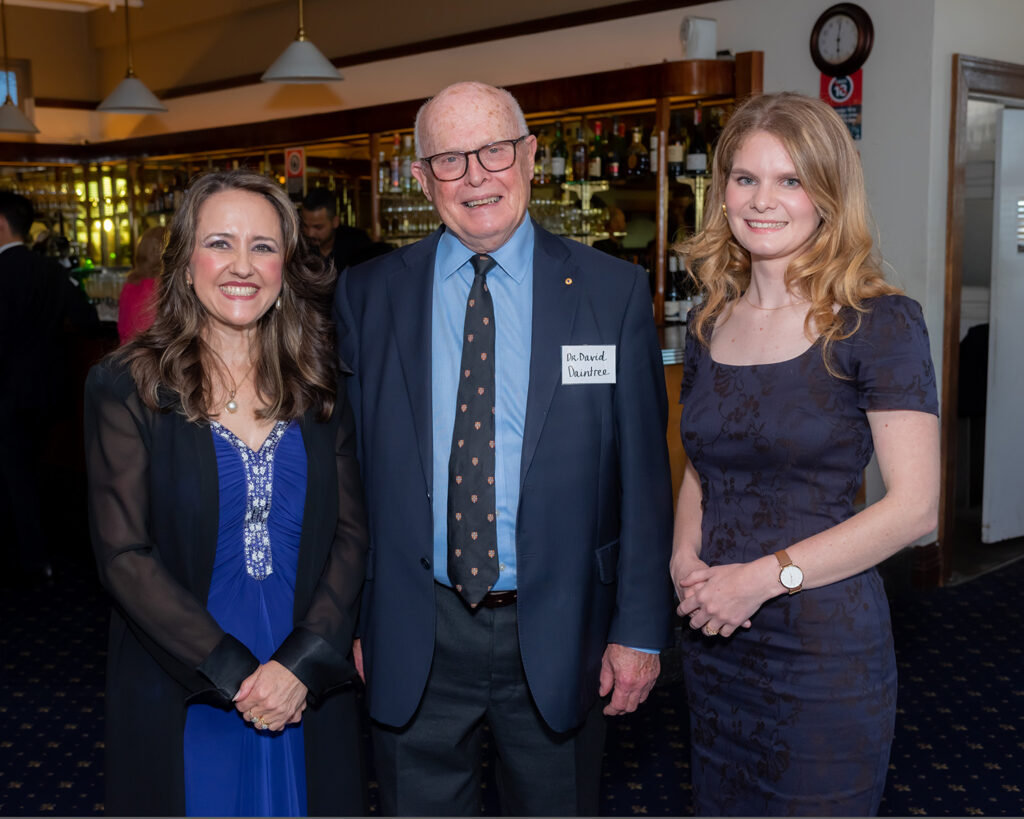
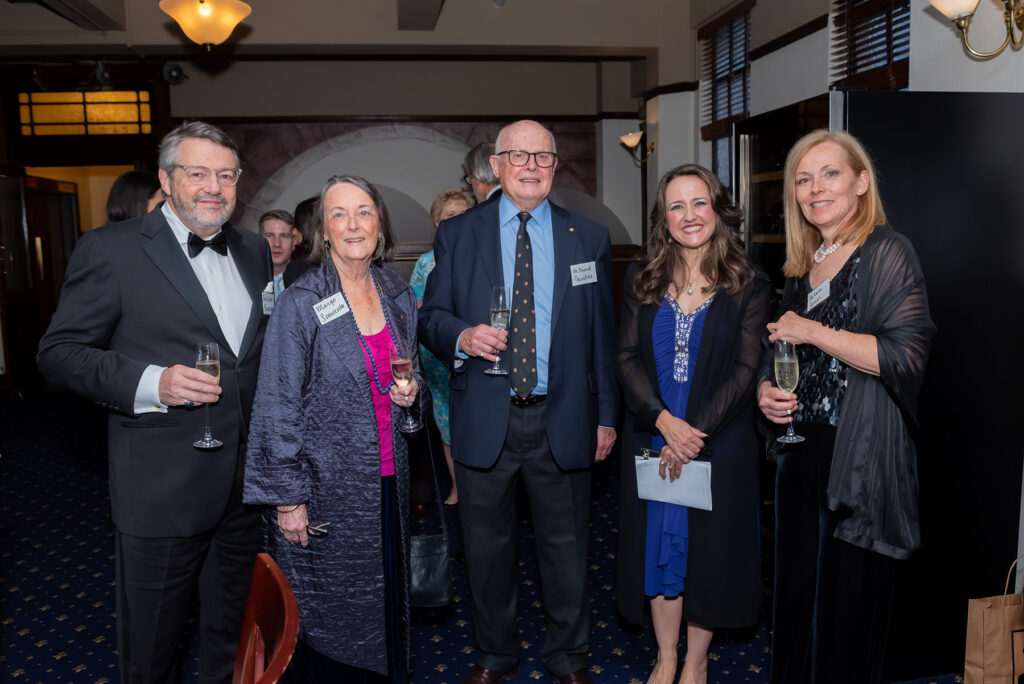
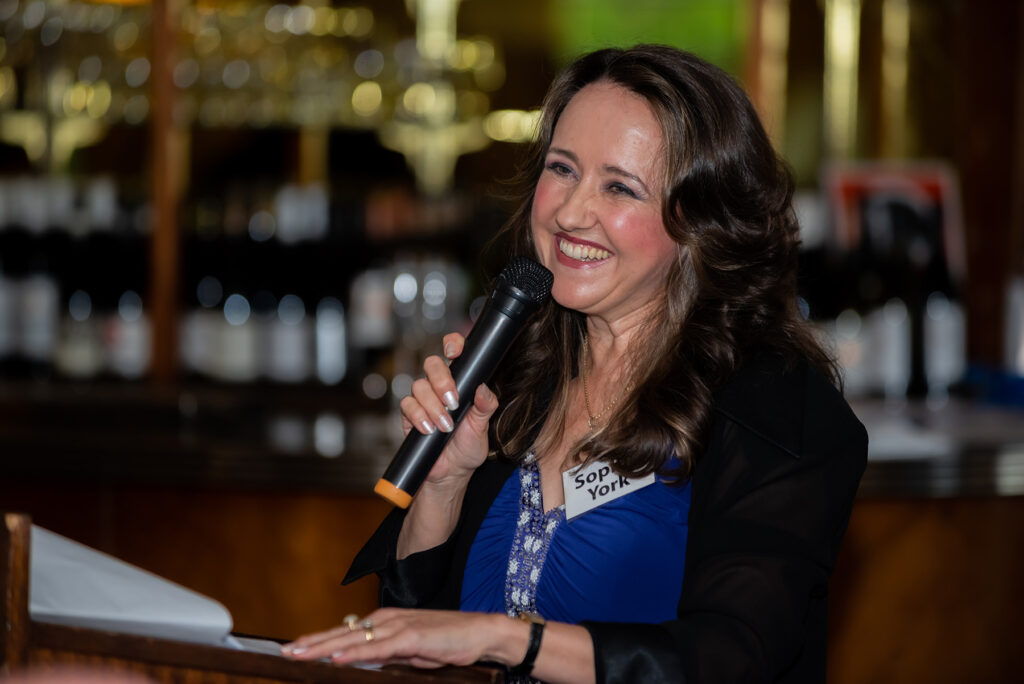
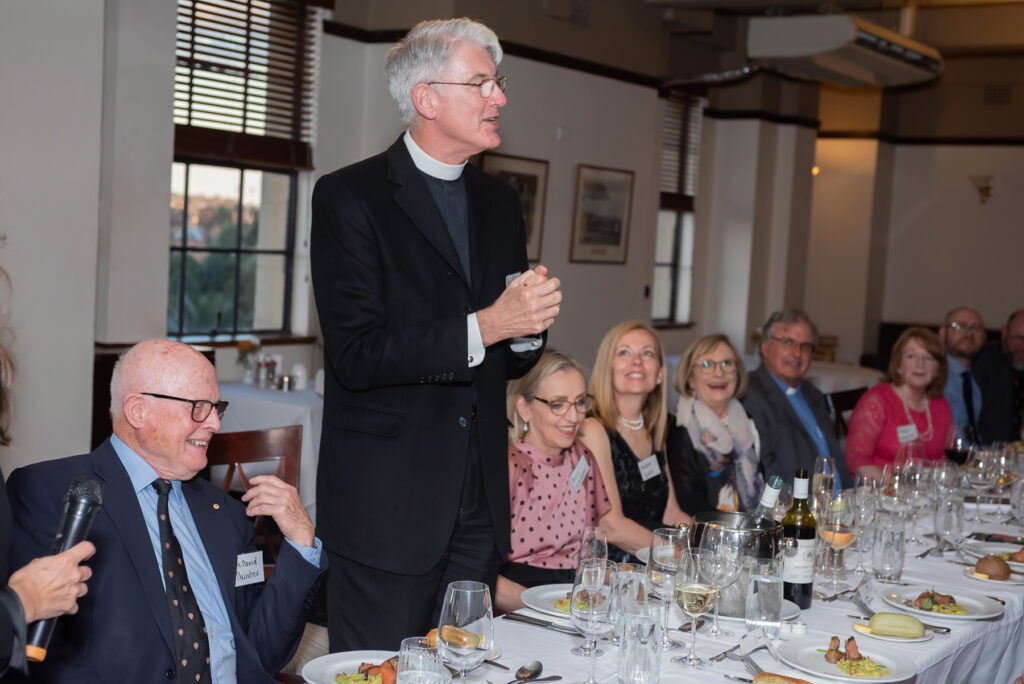
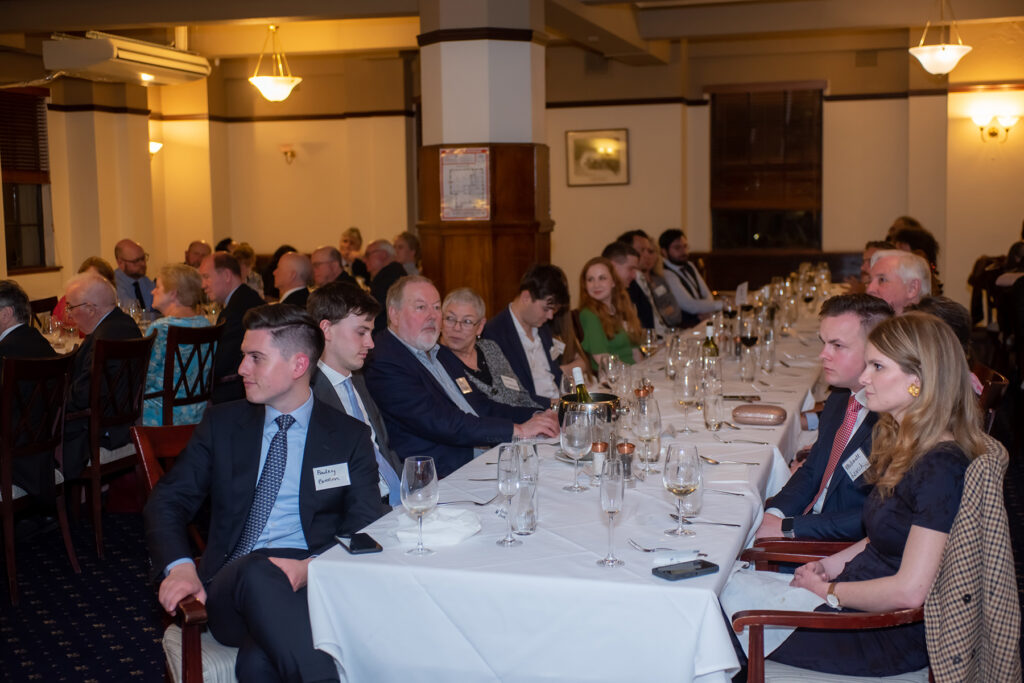
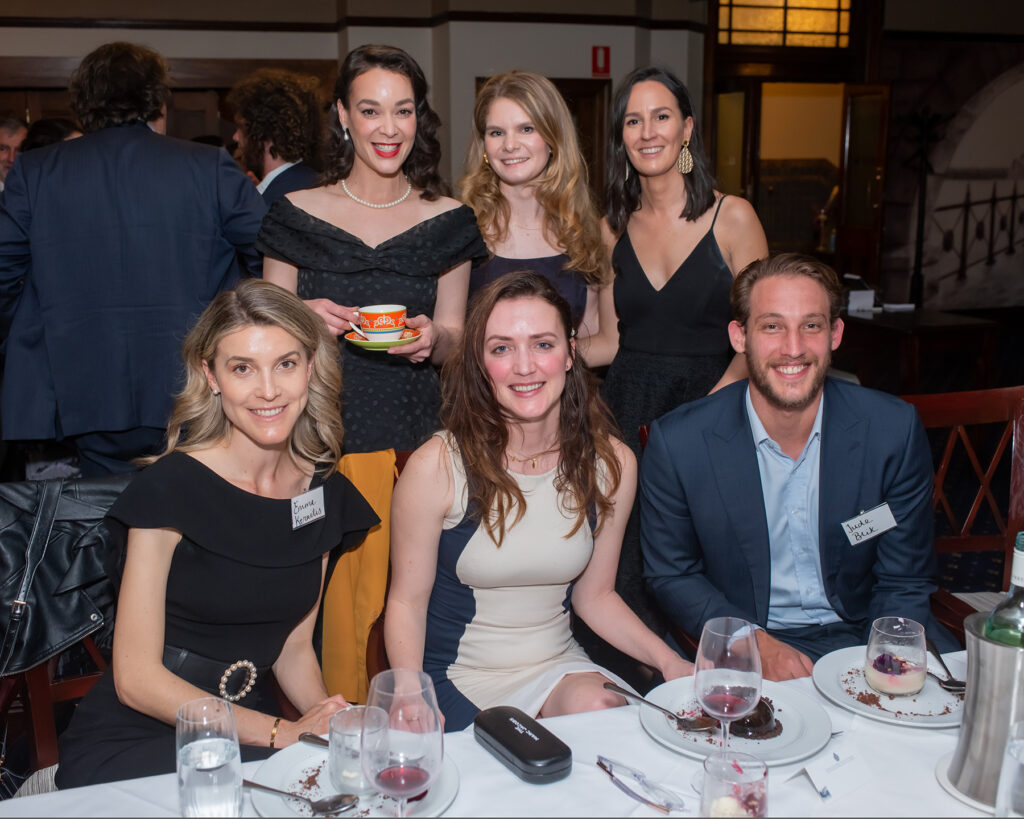
A report of the event was published on 14 November 2022 by The Catholic Weekly: Dawson Centre hosts first Sydney Dinner | The Catholic Weekly